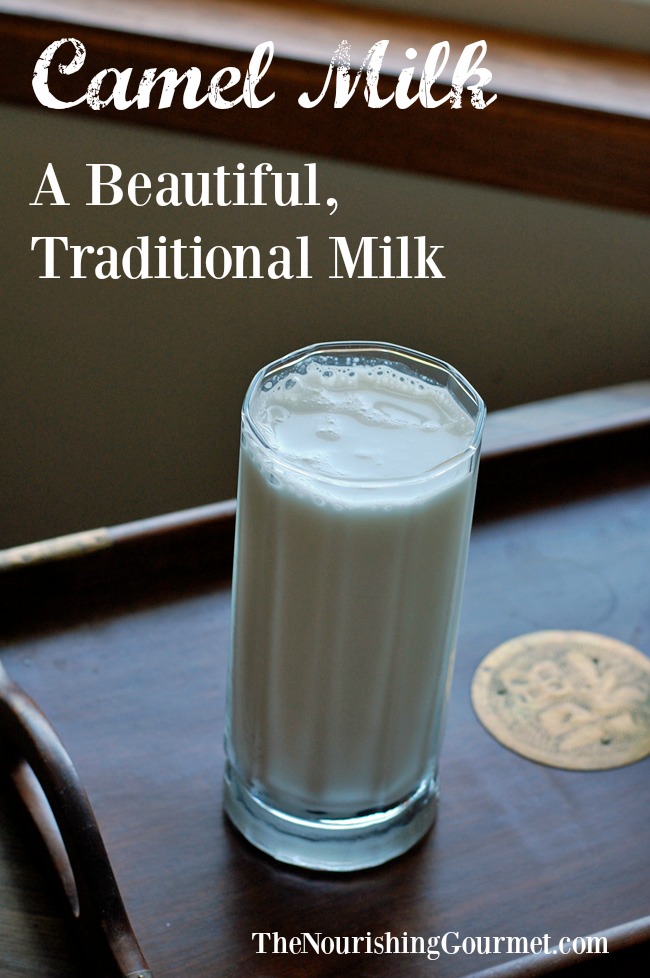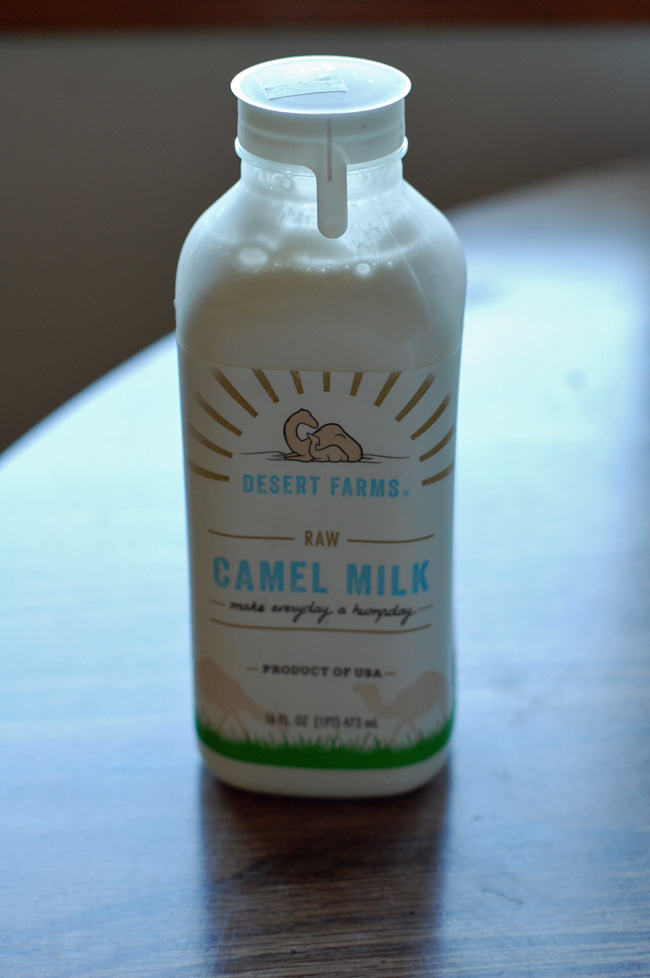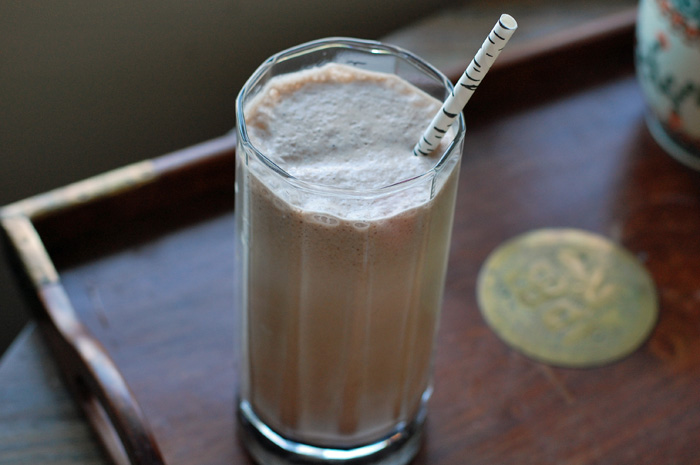
Post Partner: Desert Farms
The first I heard about camel milk was years ago when a mother of an autistic child went to extraordinary lengths to get it to America. Like many children with autism, her son had a sensitive stomach, and camel milk was one of the few foods that he tolerated well. I don’t remember the article well now, but I do remember it involved long flights and lots of ice.
So when I heard that a company, Desert Farms, was bringing camel milk to the U.S., I was intrigued. Camel milk is an important traditional food that has nourished generations in other countries. (Read this article from 2006 to get an idea of how popular it is in other countries still. Those who are sensitive to cow dairy often find that they do better with goat, sheep, or camel milk. Nutritionally it is similar to other dairy products, but with less saturated fat, and 50% less fat than cows milk. Many of my readers will be glad to know that Desert Farms milk comes from grass-fed and pastured raised camels too! You can even buy camel milk kefir from them.
As an American, I am still getting used to the idea of goats producing the milk and cheese we eat (while we avoid dairy on a daily basis because most of us are sensitive to it, we tolerate goat and sheep dairy products much better). But camel milk? Camel milk felt like a stretch when I first heard about it. But then I realized that was my natural bias in favor of the familiar in play. Cow milk is familiar to most Americans, but camel milk is just as familiar to those where it is traditional, and there is no reason to be squeamish about it!

So I tapped into my sense of adventure and decided to try it.
It is surprisingly mild! I’ve certainly had stronger goat milk in the past. My dad, who is always eager to try new things, made sure that I saved him some to try. He was also impressed with how mild it was in taste, and similar to cow milk. He expected it to taste more “wild” or “gamey”.

The real question is how my girls were going to respond to it. I whirled up some chocolate milk using cocoa powder and a little maple syrup and gave it to them without comment. They loved it. I forgot to tell them that it was camel milk until a week or two later. They suddenly remembered that I had gotten camel milk in the mail and asked, “Whatever happened to that camel milk, mom?” And we all laughed when I told them that they had already drunk it.
Really, the only disadvantage to camel milk is that it is still a niche market in the early stages in the U.S. This makes it significantly more expensive than your average gallon of cows milk, as well as the raw goat’s milk I buy at our co-op.
However, I’m thankful that this market is expanding as I think that for those with milk sensitivities, this could widen options. There are many who still want to be able to enjoy the nourishing nutrition from milk that Dr. Price and others have extolled, and this could allow many to do so. Now, unlike the mother who traveled by plane thousands of miles to get camel milk for her child, we can easily buy U.S. grown camel milk and have it delivered straight to our door.
If you’d like to try out camel milk from Desert Farms, make sure you use this special coupon, NOURISH20, for my readers! It gives you 20% off! It’s good until August 20th, 2016.
Disclosure: Special thanks to Desert Farms for partnering with me by sponsoring this post. All opinions are mine, and I only work with companies that support my vision for the blog.
Latest posts by KimiHarris (see all)
- 2 Ingredient Peppermint Bark - December 21, 2022
- Herbal Hibiscus Lemonade (Keto, THM) - March 16, 2022
- Creamy Curry Red Lentil Soup - December 8, 2021
Hi Kimberly, thank you for one more “golden milk” recipe! My family LOVED the sipping broth recipe. It was absolutely delicious! We made it recently after making a fresh batch of broth.
For Camel’s milk, I have bought Dessert Farms and it’s good. We also order it from Miller’s Organic Farm. They have great deals the more pints you buy. And, they sell some wonderful fermented drinks too.
Just wanted to share. I can’t wait to try the latte recipe and you are definitely making me think twice about getting an ice cream maker 🙂
Vania
P.S. I really love the information you share. I’ve learned a lot from your blog, so thank you!
So glad you liked the sipping broth recipe! We are making it often. 🙂
It’s pretty exciting to see camel milk taking off here in the U.S. What a great traditional food to have available to us.
And I have to admit that we use our ice cream maker often, so it’s been a great purchase for us. If you end up buying one, let me know what you think!
Very interesting! We do fresh goat’s milk here, plus yoghurt. My eldest son has several allergies, but we all actually feel better with it (my husband chooses to stick with his UHT cow’s milk). Another milk that is very sought after here in Luxembourg is donkey’s milk – I remember it from the frozen section in a local Belgian supermarket, as well!
That’s so great! I know many people who can’t tolerate cow’s milk but do well with other milks. But I have to admit that I’ve never heard of donkey’s milk before. How interesting!
I truly believe that milk from an animal, any animal, is meant to be consumed by offspring of the animal that produces it and not by humans. I think that only in rare and dire circumstances should animals milk be consumed by humans. Cows milk is for baby cows and humans milk is for human babies, etc, etc. There are numerous choices of non-animal milk to satisfy this desire for milk in adult humans, i.e; coconut milk, cashew milk, almond milk, soy milk, coconut and cashew being my two favorites. They are both nutritious and healthy and coconut milk also has many, many healing properties and cashew milk is soooo creamy…why not try these instead of animals milk?
Hey Elena,
I understand that viewpoint, and thank you for sharing. For those who tolerate it, a variety of milks can provide nutrition and even healing for specific health issues. I don’t personally think that you *need* to drink to milk to have optimal nutrition, but it can be helpful.